Pre 1993 Books on Therapy & Child Abuse
I’m Dysfunctional, You’re Dysfunctional: the recovery movement and other self-help fashions
by Wendy Kaminer, (1992), Vintage Books, New York.

A clear and witty attack on the "recovery movement", the cult of victimhood, the preoccupation with the "inner child" and the current fashion of defining personal woes (such as over-eating or dependent relationships) as addictions.
Trauma and Recovery
by Judith Herman, (1992), Basic Books, New York.
"The ordinary response to atrocities is to ban them from consciousness. Certain violations of the social compact are too terrible to utter aloud: this is the meaning of the word unspeakable". Herman is a true believer in the theory of memory repression and in memory recovery therapy. She is believes that multiple personality disorder is a common sequela of childhood trauma, although "the majority of patients with MPD conceal their symptoms, and even after the clinician has arrived at a presumptive diagnosis it is not at all unusual for the patient to reject the diagnosis."
Herman encourages therapists to tell patients if they suspect they have hidden memories of childhood abuse.
Sex Abuse Hysteria – Salem Witch Trials Revisited
by Richard A. Gardner MD, (1991), Creative Theraputics, New Jersey.
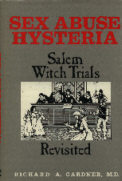
In the early 1980’s, the author began seeing the use of the sex abuse accusation as a powerful weapon for wrecking vengance on a hated spouse. It soon became apparent that the phenomenon was part of a national hysteria, similar to – but far more extensive than – what we witnessed in 1692 at the Salem witch trials.
The Satanism Scare
by James T. Richardson, Joel Best, and David G Bromley – editors (1991) Walter de Gruyter, Inc, New York.
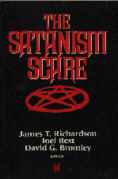
Growing numbers of police officers, child protection workers, and other public officials attend workshops supported by tax dollars to receive formal training in combatting the satanist menace. However, satanism has attracted surprisingly little attention from social scientists. This book attempts to address that neglect.
Against Therapy. Warning: psychotherapy may be hazardous to your mental health
by Jeffrey Masson, (1989), Collins, London.
Masson argues that although psychotherapists may claim they can help others because of their greater knowledge, wisdom, training and experience, what they are really doing is gaining power. "The most dangerous people in the world are those who believe they know what is best for others".
When Salem came to the Boro: the true story of the Cleveland child abuse crisis.
by Stuart Bell MP, (1988), Pan Books, London.
An excellent and detailed account of how a 197 Cleveland children were taken from their families during a six week period in 1987 on allegations of sexual abuse based on faulty medical "indicators".
The Courage to Heal: a guide for women survivors of sexual abuse
Ellen Bass & Laura Davis, (1988), Harper and Row, New York.
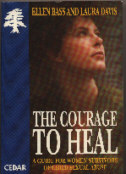
This book was probably the most influential in promoting the idea that women could be diagnosed as sexual abuse victims even if they did not know it themselves, and advancing the theory of ‘memory repression and recovery’.
Written by two non-professionals as a self-help book, it soon appeared on therapists’ bookshelves and was routinely given to their clients as recommended reading. It has apparently sold over 800,000 copies. This book strongly argued the view that many women who had been sexually abused as children had blocked off all memory of these events.
Promoted as ‘a guide for women survivors of child sexual abuse’, Courage to Heal advanced the belief that it is not unusual to repress memories of childhood sexual abuse. The authors stated that many women will not remember their abuse until they are treated psychologically. Counsellors were advised to commit themselves to their clients’ stories about sexual abuse, suspending any disbelief even if they found some parts doubtful themselves. The book instructs that if a client is uncertain that she was abused but thinks she might have been, the counsellor should accept that she most probably was. If she denies it, the topic should be revisited later. It also emphasises that healing comes from reliving the trauma memory.
Samples of the text from "Courage to Heal" include:
Many women don’t have memories…- this doesn’t mean they weren’t abused… If you are unable to remember any specific instances … but still have a feeling something abusive happened to you, it probably did… Be willing to believe the unbelievable – You must believe your client was sexually abused, even if she doubts it herself. If a client is unsure that she was abused but thinks she might have been, work as though she was… So far, amongst the hundreds of women we’ve talked to… and heard about, not one has suspected she might have been sexually abused, explored it, and determined that she wasn’t.
If ever a book deserved to be burned it is this one.
Nursery Crimes – Sexual Abuse in Day Care
by David Finkelhor and Linda Meyer Williams (1988) Sage Publications, California.
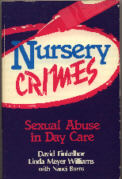
"In the past several years, partricularly following the McMartin disclosures, hundreds of other cases of sexual abuse in day care have been uncoveres around the country. Some professionals believe that it is an important opportunity to raise public awareness about the fact that even very young children may be the targets of sexual abuse and that much abuse does occur outside the family setting."
More on the McMartin case and Linda Williams here
The Child Abuse Industry
by Mary Pride (1986) Crossway Books, Winchester, Illinois.
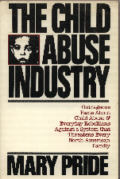
In 1985, says the author, over one million North American families were falsely accused of child abuse. As a result, their homes were invaded by bureaucrats, dossiers were opened on them, their names were put in central computers, permenantly on file; their children were asked leading questions and encouraged to inform on them.
A groundbreaking book.
The Reign of Error: psychiatry, authority, and law.
by Lee Coleman, (1984), Beacon Press, Boston.
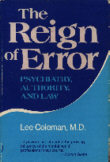
Argues that psychiatrists should not be allowed to hold the legal state-given power to decide what is good for another person with respect to matters such as adoptions, child custody, hirings, firings, parole and probation, and whether a person is fit to drive a car, vote, join or leave the military, spend money, sue or be sued. Psychiatrists have no special way of predicting who will commit a criminal act or when a criminal is cued of antisocial tendencies. Furthermore, psychiatric power involves ethical and political considerations (for example, legal insanity has implications with respect to criminal responsibility) rather than scientific and medical ones, and means the psychiatrist is acting more on behalf of the community than on behalf of the patient.
Recomended.
The Myth of Mental Illness: foundations of a theory of personal conduct.
by Thomas Szasz, (1974), Harper & Row, New York.
Warned about "the condescending paternalism of psychiatry, or the pretentious pseudo-science of psychoanalysis".



